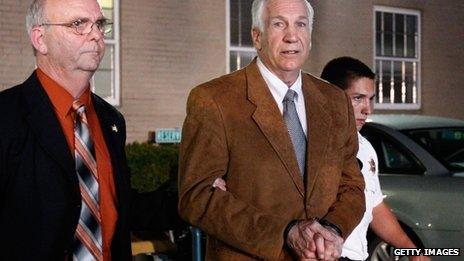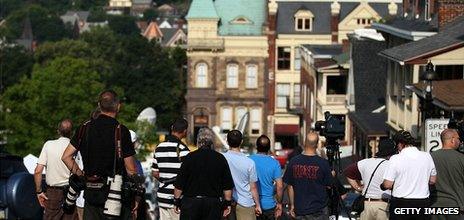Jerry Sandusky child sex abuse verdict: Justice at last
- Published

Sandusky is expected to appeal but could spend the rest of his life in jail
Members of Penn State University's community expected a quick verdict at the trial of former US college football coach Jerry Sandusky, and every hour that one did not come they grew nervous.
Those who had followed his child sex abuse case for weeks in Bellefonte predicted an open-and-shut case following the closing arguments on Thursday.
They reported confidently that hotel rooms for the jury had been cancelled - that the trial would be wrapped up in time for the jurors to take a three-day weekend.
But that did not happen and trial watchers spent Friday reading the tea leaves and debating what could be causing the delay.
Why had the jury asked for instructions regarding circumstantial evidence?
In what order did they appear to be approaching the victim's stories - chronological, or from cases with the most evidence to least?
What did it mean that the jury was working through dinner instead of taking a dinner break?
There was, beneath all of this, a steady chorus of "what if": What if the jury acquits and Jerry Sandusky walks out a free man?
The evidence, however, seemed overwhelming - gutting testimony from eight young men who reported incidences of molestation and rape.
The recollections of an assistant football coach who walked in on Sandusky in the middle of something "extremely sexual."
So what was taking so long?
'Worst possible choices'
The slow progress resulted in frustrated outbursts from within Penn State and around the country - with variations on "the verdict should be obvious" repeated across Twitter and Facebook

The media camped out in Bellefonte waited for two days as the jury deliberated
Ryan Beckler, a Penn State student, spoke early in the week about fears of a riot in the face of a not-guilty verdict - and, even worse than any physical damage, another crushing blow to the university's reputation.
"For the next 50 years, they'll say we enabled a child molester," he said, noting the close ties many jurors had to the college - a frequently-cited fact by sceptics who thought Penn Staters might close ranks and let Sandusky go free.
More than one Bellefonte resident expressed fears of a sniper being sent to do what the jury could not.
After all, the story up till that point had been one of authority figures making the worst possible choice when faced with tough decisions.
There was Sandusky, obviously. But there was also Mike McQueary, a former graduate assistant, who testified with dignity during the trial. In 2001, he came face to face with Sandusky assaulting a boy in the Penn State showers- and chose to walk away rather than intervene.
Then there was the university's revered football coach Joe Paterno, when presented with McQueary's story, went to his bosses instead of the authorities.
Pennsylvania Attorney General Linda Kelly said she hoped the ''search for justice'' would help other victims
The board of trustees decided to fire Paterno for not taking action. But doing so via a curt phone call, late at night in one of the most emotionally charged weeks in Penn State history, provided a figurative fire to a booze-soaked campus's fuel - to say nothing of the students who chose to riot when presented with this ill-timed news.
The court was expected to adjourn on Friday evening if the jurors had not reached a decision by 21:00 local time.
By 18:30, most watchers had assumed it would drag on for at least another day.
The media spent Thursday waiting in lawn chairs on the courthouse lawn for news, or glued to their staked-out position in the nearby Dairy Queen restaurant.
But by Friday, many members ventured further out into the Norman Rockwell-style streets of Bellefonte in search a decent meal.
By 20:00, reporters had congregated back at the courthouse by force of habit, though expectations were low.
But little more than an hour later the jury presented their findings, finding Sandusky guilty of 45 of 48 charges.
'Healing process'
What had taken so long, it is clear now, was that the jury had taken their task seriously.
They were not Penn State apologists looking to let one of their own off the hook.
Nor were they Paterno loyalists looking to excoriate the man whose acts had ruined Paterno's "grand experiment" - the idea that students could be first class on the field and in the classroom.
Instead, they looked at each charge thoughtfully and critically, and came to a decision that delighted the congregated crowd outside the courtroom.
The end of the trial does not mean the end of the Sandusky scandal.
He can appeal and still has to be sentenced.
Two Penn State administrators face perjury charges in connection to the case.
A comprehensive report about the school's failings in this issue, complied by a former FBI director, is expected to be released in the coming months.
And more victims of Sandusky may come forward.
"To be honest, Penn State's worst days might be ahead. I wouldn't be surprised if we see some really shocking things over the course of the summer and going into the fall," says Mr Beckler.
But the student says the verdict will go a long way towards the healing process and the shock of the past year has made the Penn State community humble about sexual abuse, and ready to learn from their mistakes.
"A lot of people have this cause in their hearts and in their heads and I don't think it will leave for a long time," he says.
- Published28 January 2012
- Published11 November 2011